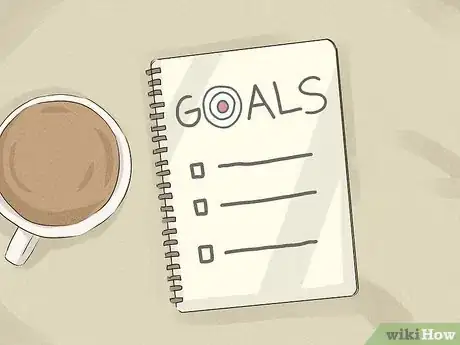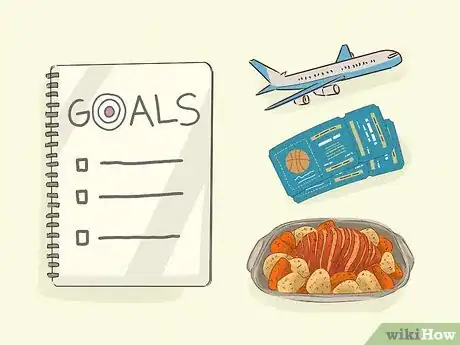This article was co-authored by John A. Lundin, PsyD. John Lundin, Psy. D. is a clinical psychologist with 20 years experience treating mental health issues. Dr. Lundin specializes in treating anxiety and mood issues in people of all ages. He received his Doctorate in Clinical Psychology from the Wright Institute, and he practices in San Francisco and Oakland in California's Bay Area.
There are 16 references cited in this article, which can be found at the bottom of the page.
This article has been viewed 50,721 times.
Focusing on yourself has many benefits. By improving your relationship with yourself, you might be able to ease symptoms of depression, anxiety, and social anxiety. Making yourself a priority could have benefits to your physical health, too, since you’ll learn to ease stress and prioritize taking care of yourself. Putting yourself first is also a great way to make time to do things you enjoy. Don’t worry about being selfish. It's not selfish to recharge and spend time alone.
Steps
Spending Time Alone
-
1Add more alone time to your schedule. It’s normal to spend a lot of your time with family, friends, and co-workers. Socialization is good (and important), but solitude is equally important. Create time each week to sit quietly with your own thoughts. Choose a time that works for you, and pick a spot where you won’t be interrupted.
- For example, you could decide to spend every Sunday afternoon relaxing on your own.
- It might feel hard or awkward at first to be alone with yourself. It’s okay to feel that way but push through your discomfort. Once you get used to it, you’ll value your solitude.
-
2Take a walk each day to clear your head. A solo walk is a great way to spend extra time with yourself. You can choose to use this time to think through something, let your mind wander, or listen to an engaging podcast. The point is just to make it a time to enjoy.[1]
- Walking in the morning might help you get energized for the day to come. You could also walk in the evening or on your lunch break to unwind from any stress.
Advertisement -
3Ask yourself questions to get to know yourself better. Building a stronger relationship with yourself will help you learn to prioritize yourself. To start this process, make a list of questions to ask yourself. It can be anything that comes to mind. The most important thing is that you answer them honestly. You can learn a lot about yourself by considering questions like:[2]
- What is your purpose?
- How are you working towards that purpose?
- What makes you happy?
- What would you like less of in your life?
-
4Treat yourself with kindness and patience. A good rule of thumb is to treat yourself like you treat others. Most people are inclined to be kind, or at least polite, to other people. Ask yourself if you are as considerate to yourself as you are to others. If you don’t think so, or can’t tell, make some changes.[3]
- For example, you might be really supportive of your partner and encourage them to achieve their goals. Think about ways that you support yourself in a similar fashion. If you’re struggling to come up with anything, make it a point to start saying a daily affirmation. It might be something like, “I have what it takes to run a half marathon.”
-
5Write a list of steps to take to improve your life. When you’re pondering your relationship with yourself, check in to see if your life is heading in the right direction. You can create a list of goals that you want to achieve or experiences you’d like to have. Create action items that will get you closer to the things you want.[4]
- For example, you might set a goal of living abroad. Next, you could create a budget, a timeline, and think about what else you need to do. Start working on crossing items off of your to-do list.
- If you have things in your life that make you unhappy, think about how to change them. Maybe you feel lonely and would like to have more friends. Make a list of how to make that happen. It might include taking a class in something you enjoy or joining a recreational sports team.
Practicing Self-Care to Avoid Burnout
-
1Meditate for 5-10 minutes a day for mental health benefits. Practicing mindful meditation has been shown to reduce stress and anxiety. Create a meditation practice for yourself where you can focus solely on your breath and clearing your mind. If you’ve never meditated before, start by sitting quietly and letting your mind wander for 5-10 minutes. You can increase the time as you get used to meditating. If negative thoughts wander in, acknowledge them and then push them away.[5]
- Look for a guided meditation online or download an app on your phone. They are really helpful if you’re just getting started.
- Pick a comfy spot to meditate where you won’t be interrupted. If you live in a hectic household, even closing the door to the bathroom will give you refuge in a pinch.
-
2Exercise most days and eat healthy to feel your best. Make it a point to take good care of your body. It’s easy to get too wrapped up in caring for others and accidentally neglect yourself. Schedule exercise the same way you would schedule any other appointment so you won’t skip it. Fuel your workouts with a balanced diet of fresh produce, whole grains, and lean proteins.[6]
- Try to get at least 30 minutes of exercise a day. You can take a walk, hit the gym, or do a body strength workout at home. Choose something you enjoy so that exercising doesn’t feel like a chore.
- Choose balanced meals such as farrow, chicken breast, and roasted veggies to give you the energy that you need. Pick foods that you like to eat instead of just going along with what your family or friends want to eat.
-
3Spend at least a few minutes a day outdoors. Getting out into nature is a great way to reconnect with yourself. Try going for a long walk on a nature trail or even just enjoying the sunset from your porch. Being outside gives you the time you need to be alone with your thoughts and to feel refreshed.[7]
-
4Sleep for 7-9 hours a night to reset your body and mind. When life gets hectic, you might sacrifice sleep in order to get everything done. That’s actually counterproductive as being tired can make you cranky, exhausted and unfocused. Make it a priority to get a good night’s sleep. Get on a good schedule by going to sleep and waking up at roughly the same time each day.[8]
- Avoid checking your phone in bed. Those emails and social media updates can wait. In fact, shut down all electronic devices an hour before bed to promote restful sleep.
- Use eye masks and earplugs as needed to block out unwanted lights or sounds. This is a great way to improve your sleep.
-
5Put fun activities on your calendar. Make having fun and relaxing a priority. Add enjoyable activities to your calendar so that you remember to keep that date with yourself.[9] Let your friends and family know that you are busy during that time if they ask you to do something else. It is fine to do things just for yourself.[10]
- You could set aside 30 minutes every evening to read a good book or watch your favorite show.
- Set a standing date with a friend to grab a coffee or play a round of golf.
-
6Spend time with friends to let off steam.[11] Hanging out with your pals is a great way to incorporate more fun into your life. That's an important part of self-care! Schedule fun outings with your friends at least once a week. If you can't get together in person, try Facetime or even an old-fashioned phone call to reconnect.[12]
- Try new things like going kayaking or taking a hike. Or just keep it casual and meet up for coffee or a movie.
Celebrating Your Strengths
-
1Don't compare yourself to others. It can be really easy to focus on others instead of yourself. Get in the habit of paying attention to your performance or feelings, rather than those of other people. This means that you shouldn’t get upset when other people succeed. While it won’t be easy to shift your mindset, make a conscious effort to just worry about yourself. It will get easier with practice.[13]
- When a co-worker gets a promotion, it can be easy to think things like, “I must not have worked hard enough. I'll never get ahead in this job.” If you catch yourself with those types of thoughts, replace them with something like, “I’ve made a lot of improvements over the past quarter. I'm going to schedule a meeting with my new manager. I bet they can give me some advice so I can get even better.”
- Don’t compare yourself to friends, either. For instance, maybe you and your friend are training for a race together. Don’t worry about their time! It doesn’t affect you. Instead, focus on your own progress.
-
2Write down reasons why you self-compare to find a pattern. It’s totally normal to compare yourself to others. If you’re having a hard time breaking the habit, reflect on when you’re most likely to measure yourself against others. Make a list of things that cause you to compare yourself to others in a negative way and then avoid them whenever possible.[14]
- Maybe you find yourself getting super competitive when you work out. Instead of hitting a spin class with a leader board, try going for a bike ride by yourself.
- If you find yourself comparing your vacations to your friends’ trips, take a break from social media. There's no need to get down on yourself by scrolling through vacation pics on Instagram.
-
3Give yourself a reward for reaching a goal. It’s important to acknowledge yourself when you do something great. You wouldn’t ignore a major achievement by your best friend or partner, so don’t ignore your own milestones. Say to yourself, “Wow, I crushed that race! I am so proud of myself!”[15]
- It can be tough to get in the habit of positive self-talk. But it’s a key part of focusing on yourself and your strengths, so make it a point to acknowledge your achievements.
- Do something fun or silly, like a happy dance or doing a little cheer for yourself. You’ll soon find yourself smiling and celebrating yourself!
-
4Start a gratitude practice to appreciate yourself. You probably let your friends and family know you’re grateful for them, so try doing the same for yourself. Make it a point to find something about yourself to appreciate each day. Start by either saying these things out loud or writing yourself little “thank-you” notes.[16]
- You might tell yourself, “Today I’m really grateful that I was able to be patient when I was stuck in traffic. I’ve been really working at not getting so worked up, and I’m proud of myself.”
-
5Journal every day to keep in touch with yourself. Journaling is a great way to express your feelings without any fear of judgment. Spend a little time each day writing about your thoughts, fears, hopes, and goals. You can do this in the morning to clear your head or as a way to wind down in the evening. Try keeping your journal with you so that you can write whenever the mood strikes.[17]
- Try keeping a gratitude journal to keep track of what you’re thankful for. You could write, “I’m really thankful for my health. I work hard to eat healthily and I’m glad I’m seeing the benefits.”
-
6Set specific goals so that they're easy to measure. It's great to have big ideas, but make sure to phrase them in ways that are specific and manageable. This will not only help you to stay on track, but you'll be able to easily measure your progress. That way, you'll know exactly when you can celebrate crushing your goals![18]
- Instead of writing something vague like, "Find a new job", write something like, "Polish my resume by October 1, then apply for at least 3 jobs a day." Breaking a big goal into smaller tasks will help you to stay on track.
-
7Use treats to celebrate and motivate yourself. Rewarding yourself when you succeed is a great way to be kind to yourself. You can also give yourself a treat when you need a little motivation. This system can really help you to tune into your own needs and wants.[19]
- If you’ve scored a cool new job, treat yourself to a nice dinner out after your first day of work.
- If you’re struggling to finish a big project, promise yourself that you will treat yourself to a weekend getaway when you complete it.
Expert Q&A
Did you know you can get premium answers for this article?
Unlock premium answers by supporting wikiHow
-
QuestionWhat can I do to focus on myself?
 John A. Lundin, PsyDJohn Lundin, Psy. D. is a clinical psychologist with 20 years experience treating mental health issues. Dr. Lundin specializes in treating anxiety and mood issues in people of all ages. He received his Doctorate in Clinical Psychology from the Wright Institute, and he practices in San Francisco and Oakland in California's Bay Area.
John A. Lundin, PsyDJohn Lundin, Psy. D. is a clinical psychologist with 20 years experience treating mental health issues. Dr. Lundin specializes in treating anxiety and mood issues in people of all ages. He received his Doctorate in Clinical Psychology from the Wright Institute, and he practices in San Francisco and Oakland in California's Bay Area.
Clinical Psychologist
References
- ↑ https://www.mhanational.org/31-tips-boost-your-mental-health
- ↑ https://psychcentral.com/health/ways-to-get-to-know-yourself-better#tips
- ↑ https://uhs.umich.edu/tenthings
- ↑ https://uhs.umich.edu/tenthings
- ↑ https://www.health.harvard.edu/blog/mindfulness-meditation-may-ease-anxiety-mental-stress-201401086967
- ↑ https://www.nhs.uk/every-mind-matters/mental-wellbeing-tips/top-tips-to-improve-your-mental-wellbeing/#healthy-lifestyle
- ↑ https://www.apa.org/monitor/2020/04/nurtured-nature
- ↑ https://www.sleepfoundation.org/how-sleep-works/how-much-sleep-do-we-really-need
- ↑ John A. Lundin, PsyD. Clinical Psychologist. Expert Interview. 1 August 2019.
- ↑ https://psychcentral.com/lib/how-clinicians-practice-self-care-9-tips-for-readers/
- ↑ John A. Lundin, PsyD. Clinical Psychologist. Expert Interview. 1 August 2019.
- ↑ https://www.sleepfoundation.org/how-sleep-works/how-much-sleep-do-we-really-need
- ↑ https://www.mentalhealth.org.uk/your-mental-health/looking-after-your-mental-health/accept-who-you-are
- ↑ https://www.psychologytoday.com/us/blog/prescriptions-life/201803/how-stop-comparing-yourself-others
- ↑ https://www.bowdoin.edu/baldwin-center/pdf/handout-self-rewards.pdf
- ↑ https://greatergood.berkeley.edu/article/item/how_gratitude_changes_you_and_your_brain
- ↑ https://www.urmc.rochester.edu/encyclopedia/content.aspx?ContentID=4552&ContentTypeID=1
- ↑ https://www.psychologytoday.com/us/blog/science-choice/201704/7-tips-setting-achievable-goals
- ↑ https://psychcentral.com/blog/psychology-rewarding-yourself-with-treats/













































































